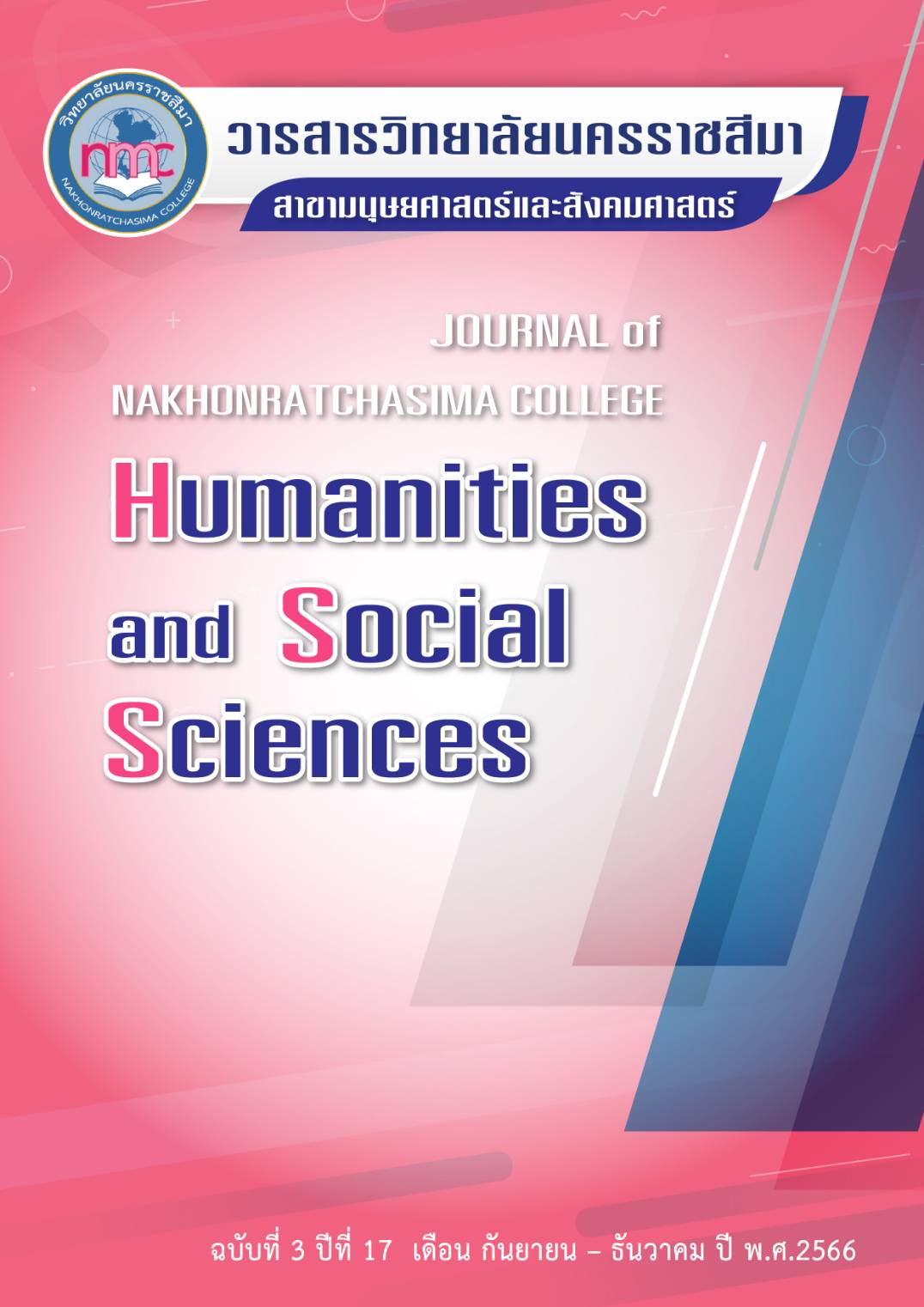A Study on the Interaction among the Competence, Engagement and Job Performance of Professional Teachers in Technical Schools : A Case Study in Shandong Province China
คำสำคัญ:
Competence, Engagement, Performance, Professional Teachers in Technical Collegesบทคัดย่อ
The purpose of this study is to (1) impact of professional teacher engagement on the performance of technical schools. (2) impact of vocational teacher's ability on the performance of technical schools and (3) exploring the impact professional teacher engagement and ability on the performance of technical schools. The through quantitative research, we will combine the two independent hot topics of engagement and competence in the field of human resources research, with a focus on studying their impact on job performance. The data was collected through a questionnaire survey from a technical school in Shandong Province, China. The sample of 521 participants provided basic data for this study.
The results were as follows:
- Within a certain range, excessive engagement may have a negative impact on performance.
- The positive impact of competence on performance.
- The interaction between engagement and ability has a positive impact on job performance.
เอกสารอ้างอิง
Beal, D. J., Weiss, H. M., Barros, E., and MacDermid, S. M. 2005. An episodic process model of affective influences on performance. Journal of Applied Psychology, 90 (6): 1054-1068.
Bi, L., Fabbri, E., Sun, Z., & Traversa, E. (2011). BaZr0. 8Y0. 2O3− δ-NiO composite anodic powders for proton-conducting SOFCs prepared by a combustion method. Journal of the Electrochemical Society, 158(7), B797.
Birkeland, I. K., and Buch, R. 2015. The dualistic model of passion for work: Discriminate and predictive validity with work engagement and workaholism. Motivation and Emotion, 39 (3): 392-408.
Burke, R. J., Oberklaid, F., & Burgess, Z. (2004). Workaholism among Australian women psychologists: Antecedents and consequences. Women in Management Review, 19(5), 252-259.
Clark, M. A., Michel, J. S., Zhdanova, L., Pui, S. Y., & Baltes, B. B. (2016). All work and no play? A meta-analytic examination of the correlates and outcomes of workaholism. Journal of Management, 42(7), 1836-1873.
Del Líbano, M., Llorens, S., Salanova, M., and Schaufeli, W. B. 2012. About the dark and bright sides of self-efficacy: Workaholism and work engagement. The Spanish Journal of Psychology, 15 (2): 688-701.
Demerouti, E., and Cropanzano, R. 2010. From thought to action: Employee work engagement and job performance. In Bakker, A. B., and Leiter, M. P. (Eds.), Work Engagement: A Handbook of Essential Theory and Research: 147-163. New York, NY: Psychology Press.
Di Stefano, G., and Gaudiino, M. 2019. Workaholism and work engagement: How are they similar? How are they different? A systematic review and metaanalysis. European Journal of Work and Organizational Psychology, 28 (3): 329-347.
Gorgievski, M. J., Bakker, A. B., and Schaufeli, W. B. 2010. Work engagement and workaholism: comparing the self-employed and salaried employees. The Journal of Positive Psychology, 5 (1): 83-96.
Hu, Q., Schaufeli, W. B., Taris, T. W., Hessen, D. J., Hakanen, J., Salanova, M., et al. (2014). "East is East and West is West and never the twain shall meet" Work engagement and workaholism across eastern and western cultures. Journal of Behavioral and Social Sciences, 1(1), 6-24.
Kahn, W. A. (1990). Psychological conditions of personal engagement and disengagement at work. Academy of management journal, 33(4), 692-724.
Krulder, L. (2010). The empirical distinctiveness of workaholism and work engagement and their relationship with job outcomes. Unpublished master's thesis of Utrecht University.
Marshall, J. H., & Sorto, M. A. (2007). Teaching what you know or knowing how to teach? The effects of different forms of teacher mathematics knowledge on student achievement in rural Guatemala. Harvard Educational Review.
Nordlund, M. M., Thorstensson, A., & Cresswell, A. G. (2004). Central and peripheral contributions to fatigue in relation to level of activation during repeated maximal voluntary isometric plantar flexions. Journal of applied physiology, 96(1), 218-225.
Schaufeli, W. B. 2016. Heavy work investment, personality and organizational climate. Journal of Managerial Psychology, 31 (6): 1057-1073.
Schaufeli, W. B., Bakker, A. B., and Salanova, M. 2006. The measurement of work engagement with a short questionnaire. Educational and Psychological Measurement, 66 (4): 701-716.
Schaufeli, W. B., Shimazu, A., and Taris, T. W. 2009. Being driven to work excessively hard: The evaluation of a two-factor measure of workaholism in the Netherlands and Japan. Cross-Cultural Research, 43 (4): 320-348.
Shimazu, A., & Schaufeli, W. B. (2009). Is workaholism good or bad for employee well-being? The distinctiveness of workaholism and work engagement among Japanese employees. Industrial Health, 47(5), 495-502.
Shimazu, A., Schaufeli, W. B., Kamiyama, K., & Kawakami, N. (2015). Workaholism vs. work engagement: The two different predictors of future well-being and performance. International Journal of Behavioral Medicine, 22(1), 18-23.
Shimazu, A., Schaufeli, W. B., Kubota, K., & Kawakami, N. (2012). Do workaholism and work engagement predict employee well-being and performance in opposite directions? Industrial Health, 50(4), 316-321.
Snir, R., and Harpaz, I. . 2012. Beyond workaholism: Towards a general model of heavy work investment. Human Resource Management Review, 22 (3): 232-243.
Snir, R., and Harpaz, I. 2006. The workaholism phenomenon: A cross-national perspective. Career Development International, 11 (5): 374-393.
Tabassum, A., & Rahman, T. (2013). Gaining the insight of workaholism, its nature and its outcome: A literature review. International Journal of Research Studies in Psychology, 2(2), 81-92.
Weng,Q.X., Zang,Y.W. (2016) The research trends, integration, and future directions of work enthusiasm Management Review, 28 (5), 186-198
Zhong, L.W. (2002) How American universities evaluate professors' annual work performance Higher Education in China, (12), 43-44
ดาวน์โหลด
เผยแพร่แล้ว
รูปแบบการอ้างอิง
ฉบับ
ประเภทบทความ
สัญญาอนุญาต
จรรยาบรรณผู้เขียนบทความ
ผู้เขียนบทความต้องรับรองว่าบทความนี้ไม่เคยตีพิมพ์ในวารสารใดหรือสิ่งพิมพ์อื่นๆ มาก่อน ต้องไม่คัดลอกผลงานผู้อื่นมาปรับแต่งเป็นบทความของตน และไม่ได้อยู่ระหว่างการเสนอเพื่อพิจารณาตีพิมพ์ อีกทั้งยอมรับหลักเกณฑ์การพิจารณาและการตรวจแก้ไขบทความต้นฉบับโดยกองบรรณาธิการวารสารวิทยาลัยนครราชสีมา สาขามนุษยศาสตร์และสังคมศาสตร์
บทความทุกเรื่องได้รับการตรวจพิจารณาทางวิชาการโดยผู้ทรงคุณวุฒิที่มีประสบการณ์และมีความเชี่ยวชาญตรงตามสาขาของบทความ ซึ่งผู้เขียนต้องแก้ไขตามคำแนะนำของผู้ทรงคุณวุฒิภายในระยะเวลาที่กำหนด หากไม่เป็นไปตามกำหนดกองบรรณาธิการขอสงวนสิทธิ์และยกเลิกการตีพิมพ์โดยจะแจ้งให้ทราบต่อไป
ข้อความที่ปรากฏในบทความของวารสารนี้เป็นความคิดเห็นของผู้เขียนซึ่งไม่เกี่ยวข้องกับวิทยาลัยนครราชสีมาแต่อย่างใด และกองบรรณาธิการขอสงวนสิทธิ์ในการพิจารณาและตรวจประเมินบทความเพื่อตีพิมพ์ในวารสารของวิทยาลัยนครราชสีมา สาขามนุษยศาสตร์และสังคมศาสตร์



